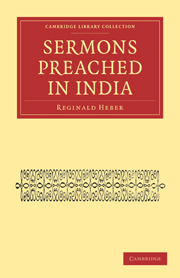Book contents
- Frontmatter
- PREFACE
- Contents
- THE VALEDICTORY ADDRESS
- A CHARGE
- SERMON I PREACHING OF ST. JOHN THE BAPTIST
- SERMON II OFFICE OF CHRIST
- SERMON III CHARACTER OF CHRIST AND HIS RELIGION
- SERMON IV CHRIST PREACHING TO SINNERS
- SERMON V THE LAW AND THE GOSPEL
- SERMON VI THE CHRISTIAN'S FAITH AND FEAR
- SERMON VII THE CHRISTIAN'S TREATMENT ON EARTH
- SERMON VIII THE PHARISEE AND THE PUBLICAN
- SERMON IX THE GOOD SAMARITAN
- SERMON X LABOURERS IN THE VINEYARD
- SERMON XI THE CONVERSION OF THE HEATHEN
- SERMON XII THE OMNIPRESENCE OF GOD
- SERMON XIII SIN AND GRACE
- SERMON XIV ON THE LOVE OF GOD
- SERMON XV CHRISTMAS DAY
- SERMON XVI NEW YEAR'S DAY
- SERMON XVII EASTER DAY
- ADDRESS ON CONFIRMATION
SERMON I - PREACHING OF ST. JOHN THE BAPTIST
Published online by Cambridge University Press: 05 March 2012
- Frontmatter
- PREFACE
- Contents
- THE VALEDICTORY ADDRESS
- A CHARGE
- SERMON I PREACHING OF ST. JOHN THE BAPTIST
- SERMON II OFFICE OF CHRIST
- SERMON III CHARACTER OF CHRIST AND HIS RELIGION
- SERMON IV CHRIST PREACHING TO SINNERS
- SERMON V THE LAW AND THE GOSPEL
- SERMON VI THE CHRISTIAN'S FAITH AND FEAR
- SERMON VII THE CHRISTIAN'S TREATMENT ON EARTH
- SERMON VIII THE PHARISEE AND THE PUBLICAN
- SERMON IX THE GOOD SAMARITAN
- SERMON X LABOURERS IN THE VINEYARD
- SERMON XI THE CONVERSION OF THE HEATHEN
- SERMON XII THE OMNIPRESENCE OF GOD
- SERMON XIII SIN AND GRACE
- SERMON XIV ON THE LOVE OF GOD
- SERMON XV CHRISTMAS DAY
- SERMON XVI NEW YEAR'S DAY
- SERMON XVII EASTER DAY
- ADDRESS ON CONFIRMATION
Summary
St. John i. 20.
He confessed and denied not, but confessed “I am not the Christ.”
About the middle of the long reign of the Roman Emperor Tiberius, when all mankind were in hushed and anxious expectation of that Great Deliverer whom both Jewish and Pagan prophecies had foretold as about this time to make his appearance upon earth; a new and mighty teacher of morality appeared in the wilderness of Judæa. His dress, his voice, his aspect, were the image of austere holiness, and of the then almost forgotten severities of the ancient prophets and penitents. His hair and beard, unshorn, after the pattern of the Nazarites, hung wildly over his breast and shoulders; his half-naked body was macerated with frequent fasting; his raiment was the coarse hair cloth which covered the Arab's tent; his food, the insects of the air and of the field; and his luxury, the honey left by wild bees in the sun-burnt rocks of Arabia Petræa.
He was recognized as John, the son of a Jewish priest, whose birth had, some thirty years before, been announced by repeated miracles; foretold by an angel, preceded by a miraculous dumbness and followed by a miraculous cure; whose boyhood and youth had, from the first, been strange and solitary, and who had fled from the amusements natural to his age, and the pursuits appropriate to his station, to the dismal and dangerous retreat of the waste and howling wilderness: till now, in the full vigour of his mind, and sublimed and purified by a life of meditation, he took his station at the ford of Bethabara, and, in words full of power and dignity, called on his countrymen to escape from the wrath to come.
- Type
- Chapter
- Information
- Sermons Preached in India , pp. 33 - 46Publisher: Cambridge University PressPrint publication year: 2011First published in: 1829



